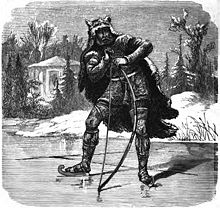This is an old revision of this page, as edited by Bloodofox (talk | contribs) at 16:02, 20 January 2009 (Adjusted caption text.). The present address (URL) is a permanent link to this revision, which may differ significantly from the current revision.
Revision as of 16:02, 20 January 2009 by Bloodofox (talk | contribs) (Adjusted caption text.)(diff) ← Previous revision | Latest revision (diff) | Newer revision → (diff)
In Norse mythology, Ýdalir ("yew-dales") is a location containing a dwelling owned by the god Ullr. Ýdalir is solely attested in the Poetic Edda, compiled in the 13th century from earlier traditional sources. Scholarly theories have been proposed about the implications of the location.
Attestations
Ýdalir is solely attested in stanza 5 of the poem Grímnismál (collected in the Poetic Edda), where Odin (disguised as Grímnir) tells the young Agnar that Ullr owns a dwelling in Ýdalir. The stanza reads (Ýdalir is here translated as Ydalir):
Theories
Discussing Ýdalir, Henry Adams Bellows comments that "the wood of the yew-tree was used for bows in the North just as it was long afterwards for England." Rudolf Simek says that "this connexion of the god with the yew-tree, of whose wood bows were made (cf. ON ýbogi 'yew bow'), has led to Ullr being seen as a bow-god." Andy Orchard comments that Ýdalir is an "aptly named dwelling-place archer-god, Ull." According to Hilda Ellis Davidson, while Valhalla "is well known because it plays so large a part in images of warfare and death," the significance of other halls in Norse mythology such as Ýdalir, and the goddess Freyja's afterlife location Fólkvangr have been lost.
Notes
References
- Bellows, Henry Adams (Trans.) (2004). The Poetic Edda: The Mythological Poems. Courier Dover Publicans. ISBN 0486437108
- Davidson, Hilda Roderick Ellis (1993). The Lost Beliefs of Northern Europe (illustrated edition). Routledge. ISBN 0415049377
- Thorpe, Benjamin (Trans.) (1907). The Elder Edda of Saemund Sigfusson. Norrœna Society.
- Orchard, Andy (1997). Dictionary of Norse Myth and Legend. Cassell. ISBN 0 304 34520 2
- Simek, Rudolf (2007) translated by Angela Hall. Dictionary of Northern Mythology. D.S. Brewer. ISBN 0859915131